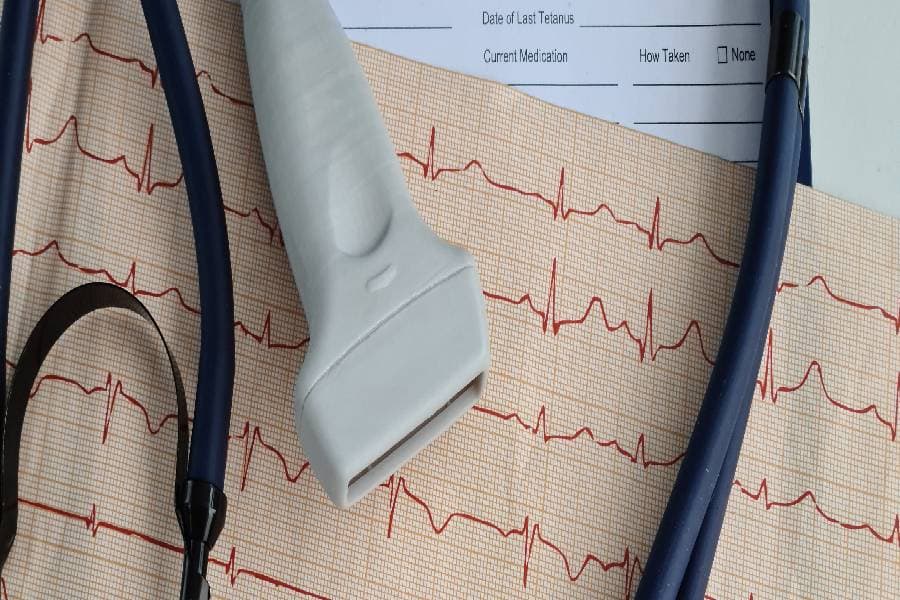Heart disease is the leading cause of death in the United States, affecting women, men, and people of all backgrounds and ethnic groups. Fortunately, diagnostic tools are available to help cardiologists accurately diagnose and treat heart disease. An echocardiogram uses ultrasound technology to examine the heart. It is a quick and minimally invasive procedure for evaluating cardiac structure and function. Learn more about echocardiograms from one of the cardiovascular physicians at Richmond University Medical Center, Sean Galligan, MD, FACC.
Understanding Heart Disease in America
Research indicates the prevalence of heart disease in the U.S. According to the Centers for Disease Control and Prevention (CDC), one person dies every 33 seconds from cardiovascular disease. In 2021, about one in five deaths were attributed to heart disease.
Heart disease has been the leading cause of death in America for decades. However, the COVID-19 pandemic compounded this health concern.
“Heart disease is more prominent than ever nationwide (and on Staten Island), especially with many people being more sedentary and indulging in unhealthy eating over the past few years,” Dr. Galligan says.
Quarantines and lockdowns may have prevented individuals from getting regular exercise. The pandemic increased anxiety and depression in others, encouraging them to turn to overeating, smoking, or other habits for comfort.
What Is an Echocardiogram?
Echocardiograms are a diagnostic tool that enables cardiologists to view the heart and understand how it functions in a patient. It relies on ultrasound technology, a reliable technique with multiple uses in healthcare.
“Ultrasound technology has been around for a long time. It is the same technology used to monitor pregnancies. It enables us to physically see and evaluate the heart’s structures and measure hemodynamic aspects of the heart [dynamics of blood flow] using highly precise Doppler technology,” Dr. Galligan explains.
What Does an Echocardiogram Show?
During an echocardiogram, cardiologists examine the following:
- How well the ventricles (chambers)of the heart move/contract
- Whether the four valves of the heart open and close properly
- The general anatomy of the heart to ensure there are no thickening/calcification, masses, or abnormalities related to blood flow
An echocardiogram can reveal several problems, such as stiff or leaky valves. The insights this tool provides cardiologists guide diagnosis and treatment.
As Dr. Galligan explains, “At Richmond University Medical Center, our ultrasound technicians are experts in obtaining these images and collecting the necessary information and calculations so that we can accurately interpret them. Ultimately, echocardiograms give us such a breadth of information, both anatomically and hemodynamically, and are one of the mainstays of cardiology.”
Echocardiogram vs. EKG: What Is the Difference?
Another tool for cardiovascular care is an electrocardiogram (EKG). Given the closeness of their spelling, patients might confuse the two procedures. An EKG evaluates the electrical signals that come from the heart. Echocardiograms provide a physical and anatomical image of the heart so physicians can understand its functionality.
Who Is the Echocardiogram Procedure For?
Patients of all ages might need an echocardiogram. Some reasons a patient might need an echocardiogram include:
- Received an abnormal EKG
- Has heart murmurs or is suspected to have valvular abnormalities
- Has signs, symptoms, and risk factors for heart failure
Cardiologists might also use echocardiograms to screen babies for heart murmurs or malformation. Teen athletes might also need them if sports put them at a higher risk for sudden cardiac death.
Can Patients Prevent Heart Disease?
Some risk factors for heart disease are outside a person’s control. For instance, they might have a family history of heart disease or conditions that increase their risk, such as diabetes or high blood pressure. However, many risk factors are lifestyle-related, such as diet, exercise, alcohol intake, and tobacco use.
All patients want to maintain a healthy heart, but this can be especially important for those with risk factors for heart disease. Some tips for boosting heart health include:
- Maintain a healthier diet, such as the DASH diet, which is high in fresh fruits, vegetables, and fish and low in fat, red meat, processed foods, and sugar.
- Prepare food with fresh ingredients more often than dining out.
- Increase intake of fiber and decrease carbohydrates.
- Manage conditions that increase the risk for heart disease, such as diabetes, high blood pressure, high cholesterol, and sleep apnea.
- Commit to 20-30 minutes of exercise a day.
- Stop smoking.
What Happens During an Echocardiogram?
At Richmond University Medical Center, technicians typically perform echocardiograms in exam rooms. In cases where patients require immediate care, physicians will perform them bedside in the hospital.
“This quick and simple procedure takes anywhere from 15-20 minutes and involves an ultrasound probe that takes pictures of the heart on the chest wall. It is done superficially, and there is nothing invasive like IVs. We use gel to enhance the qualify of the images,” Dr. Galligan says.
Trust Cardiology Care from Richmond University Medical Center
A suspected case of heart disease can be overwhelming for patients. Echocardiograms enable physicians to understand cardiac structure and function to correctly diagnose patients and offer the appropriate treatment.
Patients in Staten Island, New York, can receive reliable cardiovascular care from the cardiovascular physicians at Richmond University Medical Center. The team performs the procedure in the hospital and at 1161 Victory Boulevard, Staten Island, NY 10301.
Dr. Galligan reassures patients: “Here at Richmond University Medical Center, we are an accredited lab, we administer echocardiograms routinely, and all our cardiologists are adept at interpretation.”
The insights physicians gain from echocardiograms can be life-saving, making this test essential for diagnosis and treatment. Contact Richmond University Medical Center to schedule an appointment today or find additional resources on cardiovascular health.




